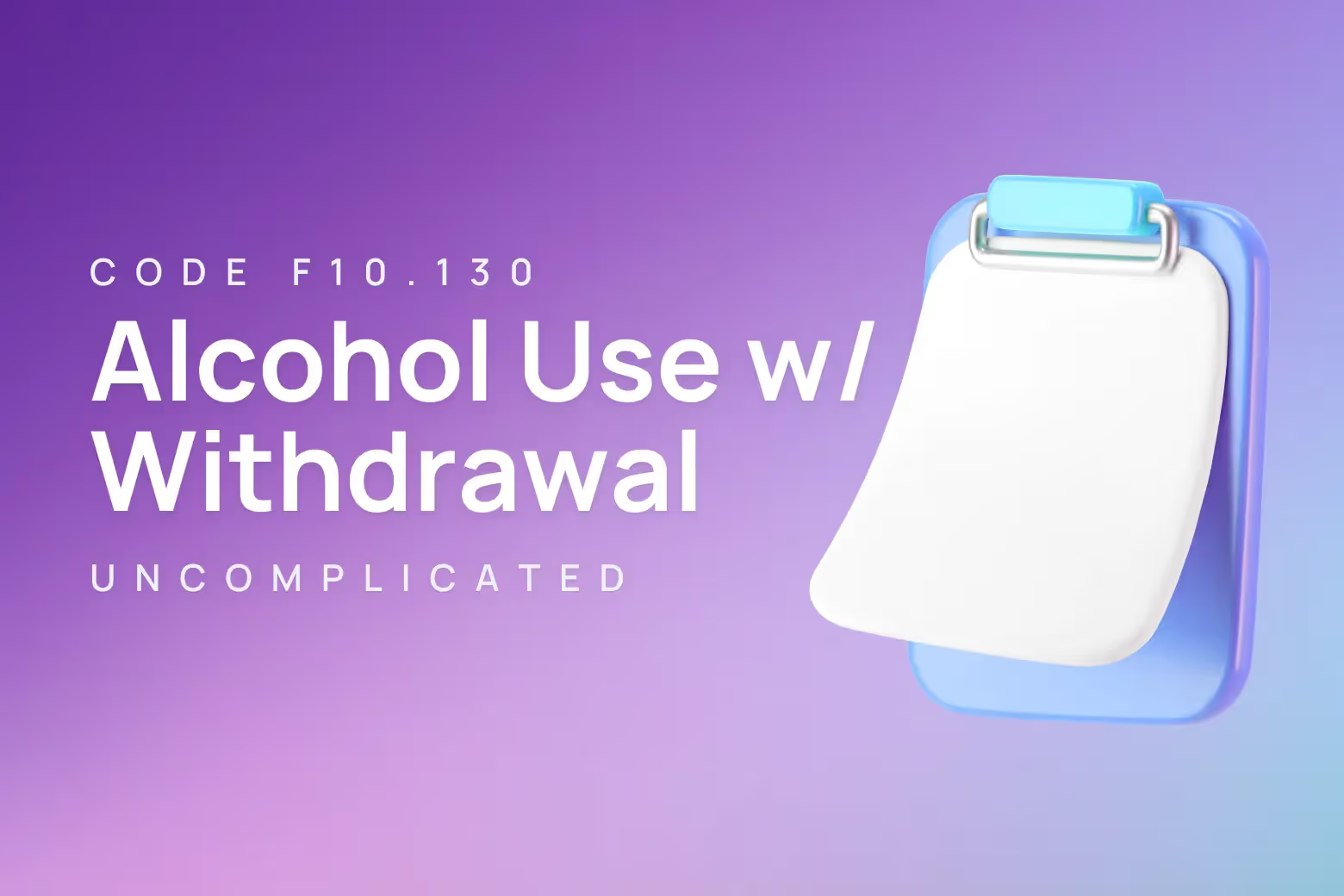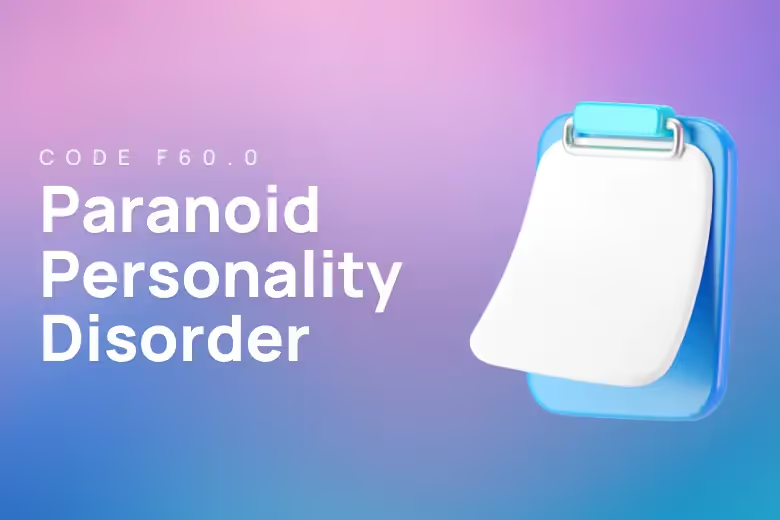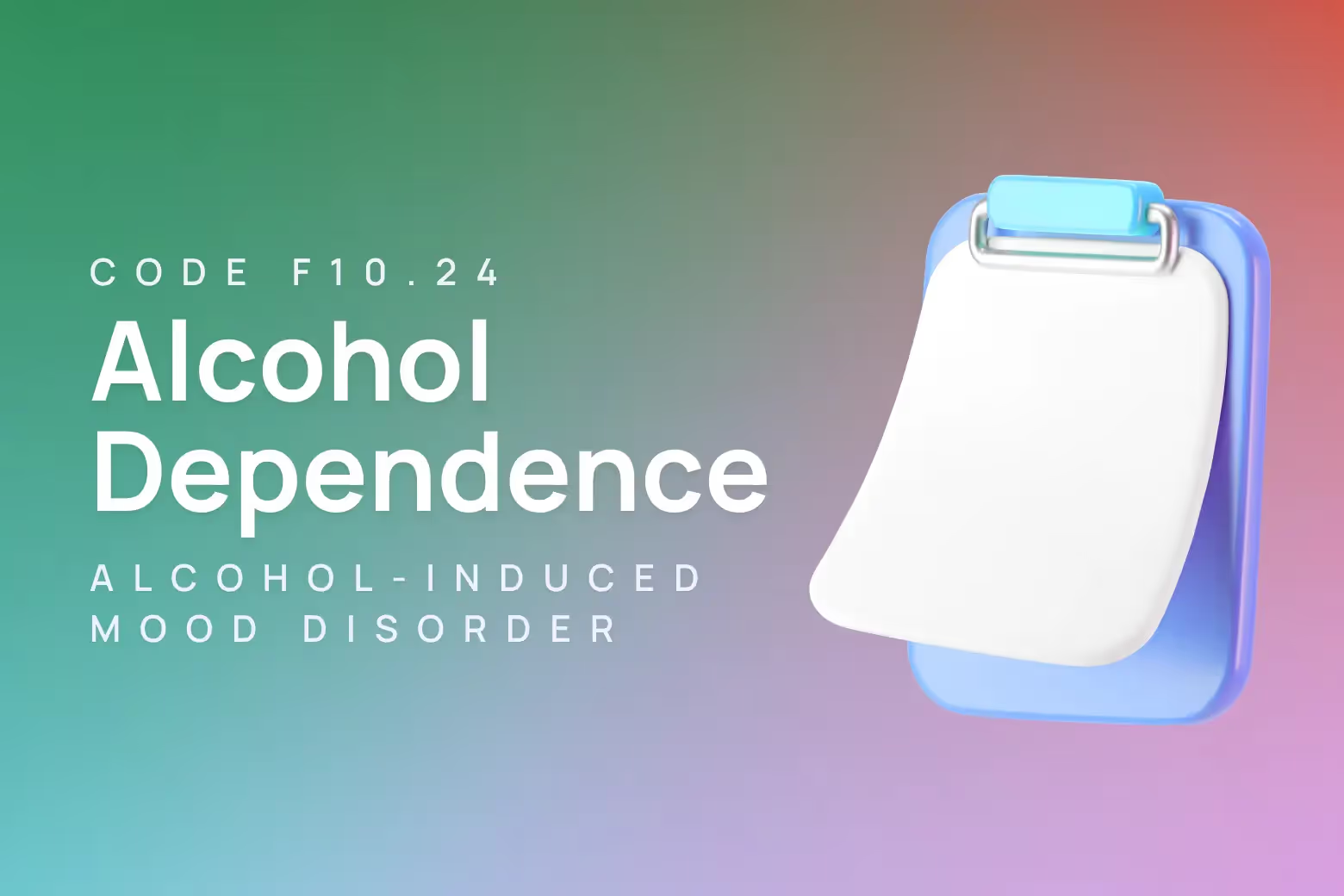ICD-10 code for alcohol abuse with withdrawal, uncomplicated

F10.130 is the ICD-10 code for alcohol abuse with withdrawal, uncomplicated.
This diagnostic code identifies individuals who meet criteria for alcohol abuse and are experiencing withdrawal symptoms without severe complications like delirium or seizures.
Accurate diagnosis and coding ensures appropriate treatment planning and billing compliance for clinicians treating clients with alcohol-related disorders.
Key features:
- F10.130 ICD-10 code applies to mild alcohol use disorder (2-3 symptoms) with uncomplicated withdrawal symptoms
- Withdrawal symptoms include tremor, sweating, anxiety, nausea, and sleep disturbances
- Excludes severe complications like seizures, delirium, or perceptual disturbances
- Requires presence of characteristic alcohol withdrawal syndrome without life-threatening features

Diagnostic criteria for alcohol abuse with withdrawal, uncomplicated (F10.130)
The F10.130 diagnosis requires meeting criteria for both alcohol abuse and experiencing uncomplicated withdrawal symptoms.
This code specifically applies to individuals with mild alcohol use disorder who develop withdrawal symptoms but without severe medical complications.
Alcohol abuse, now termed mild alcohol use disorder, requires the presence of 2-3 symptoms from the established criteria within a 12-month period. These symptoms include:
- consuming alcohol in larger amounts than intended
- unsuccessful attempts to cut down use
- spending excessive time obtaining or recovering from alcohol
- experiencing cravings
- continued use despite social or occupational problems
The withdrawal component involves characteristic symptoms that develop 6-24 hours after the last drink.
Uncomplicated withdrawal presents with autonomic hyperactivity including sweating, elevated heart rate, and elevated blood pressure.
Gastrointestinal symptoms commonly include nausea, vomiting, loss of appetite, and digestive upset.
Cognitive and perceptual changes manifest as poor concentration, anxiety, restlessness, and disturbed sleep with vivid dreams.
Key diagnostic requirements include:
- Meeting 2-3 criteria for alcohol use disorder within 12 months
- Presence of characteristic withdrawal syndrome developing within 24 hours of reduced alcohol use
- Withdrawal symptoms causing significant distress or functional impairment
- Absence of severe complications including seizures, delirium, or hallucinations
- Symptoms not better explained by another medical condition or mental health disorder
When to use F10.130 diagnosis code
Differential diagnosis remains essential when considering F10.130, as several related codes describe similar presentations with important clinical distinctions.
Understanding these differences ensures accurate coding and appropriate treatment planning.
F10.130 vs F10.131 (Alcohol abuse with withdrawal delirium)
F10.131 applies when alcohol withdrawal includes delirium, also known as delirium tremens. This severe complication involves disturbance of consciousness, cognitive changes, and perceptual disturbances that develop over hours to days.
Unlike F10.130, clients with F10.131 experience confusion, disorientation, agitation, and often visual or tactile hallucinations.
The delirium typically begins 2-3 days after cessation and represents a medical emergency requiring intensive monitoring and treatment.
F10.130 vs F10.132 (Alcohol abuse with withdrawal with perceptual disturbance)
F10.132 describes withdrawal accompanied by hallucinations or perceptual disturbances without the cognitive impairment seen in delirium.
Clients maintain clear consciousness but experience visual, auditory, or tactile hallucinations during withdrawal.
These perceptual symptoms distinguish F10.132 from the uncomplicated presentation coded as F10.130, where sensory experiences remain intact.
F10.130 vs F10.139 (Alcohol abuse with withdrawal, unspecified)
F10.139 serves as a catch-all code when withdrawal symptoms are present but insufficient information exists to determine specific complications.
F10.130 provides greater specificity by confirming the absence of severe complications, making it the preferred code when clinical assessment clearly establishes uncomplicated withdrawal.
Related ICD-10 codes
- F10.13 - Alcohol abuse with withdrawal (parent code)
- F10.131 - Alcohol abuse with withdrawal delirium
- F10.132 - Alcohol abuse with withdrawal with perceptual disturbance
- F10.139 - Alcohol abuse with withdrawal, unspecified
Interventions and CPT codes for alcohol abuse with withdrawal
Evidence-based treatment for F10.130 requires addressing both the acute withdrawal symptoms and underlying alcohol use patterns through comprehensive intervention approaches.
Pharmacological management
Benzodiazepines represent first-line treatment for alcohol withdrawal management.
Diazepam proves most effective due to its rapid onset and long duration, helping prevent symptom recurrence between doses.
For uncomplicated withdrawal, clinicians typically use symptom-triggered dosing based on standardized assessment scales, administering 5-10 mg every 4 hours for mild symptoms or 20 mg every 2-4 hours for moderate symptoms.
Treatment duration usually spans 3-5 days with gradual dose reduction.
Relevant CPT codes:
- 90791 - Psychiatric diagnostic evaluation for initial assessment and treatment planning
- 90834 - Psychotherapy, 45 minutes for individual treatment sessions
- 90837 - Psychotherapy, 60 minutes for extended individual sessions
Psychotherapeutic interventions
Motivational interviewing helps clients explore ambivalence about alcohol use and build motivation for change.
Cognitive-behavioral therapy targeting substance use addresses thought patterns and behaviors that maintain drinking patterns.
Relapse prevention strategies teach clients to identify triggers and develop coping skills for high-risk situations.
Relevant CPT codes:
- 90832 - Psychotherapy, 30 minutes for brief individual sessions
- 90846 - Family psychotherapy without patient for family education and support
- 90847 - Family psychotherapy with patient for addressing family dynamics
Screening and brief intervention
Structured screening using validated instruments like the AUDIT helps identify alcohol misuse severity and track treatment progress.
Brief interventions incorporate motivational enhancement techniques to promote behavior change during short clinical encounters.
Relevant CPT codes:
- 99408 - Alcohol screening and brief intervention, 15-30 minutes
- 99409 - Alcohol screening and brief intervention, greater than 30 minutes
- 96127 - Brief emotional/behavioral assessment per screening instrument
Group treatment approaches
Group therapy provides peer support and shared learning experiences for clients addressing alcohol use patterns.
Specialized substance use groups focus on relapse prevention skills, coping strategies, and recovery maintenance.
Relevant CPT codes:
- 90853 - Group psychotherapy for substance use treatment
- H0049 - Alcohol screening (Medicaid programs)
- H0050 - Alcohol brief intervention, per 15 minutes (Medicaid programs)
How Upheal improves F10.130 ICD-10 documentation
Clinical documentation platforms can significantly improve the accuracy and efficiency of diagnosing and treating alcohol abuse with withdrawal.Modern tools help clinicians maintain precise records while focusing more time on direct client care.
Suggesting appropriate ICD-10 codes based on session content
AI-powered documentation platforms analyze session notes and client presentations to suggest relevant diagnostic codes.
When clients describe withdrawal symptoms like tremor, anxiety, and sleep disturbances alongside patterns of problematic alcohol use, the system can identify F10.130 as a potential diagnosis.
This coding assistance helps ensure clinicians consider all relevant diagnostic possibilities while maintaining accuracy in their clinical decision-making process.
Maintaining HIPAA-compliant records with proper diagnostic coding
Secure clinical platforms ensure all withdrawal assessments and treatment notes remain properly encrypted and accessible only to authorized personnel.
Automated coding suggestions include proper specifiers and modifiers, helping clinicians document the absence of severe complications that distinguish F10.130 from more complex withdrawal presentations.
This systematic approach reduces coding errors that could impact treatment authorization or billing accuracy.
Reducing administrative burden so you can focus on client care
Time-saving documentation features allow clinicians to spend more energy on therapeutic interventions rather than paperwork.
Automated progress note generation captures key withdrawal symptoms, treatment responses, and safety assessments without requiring extensive manual data entry.
This efficiency proves especially valuable when managing clients through acute withdrawal phases that demand close clinical attention and frequent monitoring.
Supporting clients with alcohol abuse with withdrawal, uncomplicated
Treating clients with F10.130 requires balancing medical stabilization with therapeutic engagement to promote long-term recovery.
The uncomplicated nature of their withdrawal provides an opportunity for outpatient management while building motivation for ongoing treatment.
Clinical assessment should monitor withdrawal severity using standardized scales while evaluating social supports and environmental factors that influence treatment success.
Many clients with uncomplicated withdrawal benefit from ambulatory detoxification with regular check-ins, though some may require brief residential stabilization depending on their psychosocial circumstances and previous withdrawal history.
Building therapeutic rapport during the withdrawal phase creates foundation for ongoing recovery work.
Clients often feel physically uncomfortable and emotionally vulnerable, making empathetic support essential for engagement.
Education about the withdrawal process helps normalize their experience while preparing them for the recovery journey ahead.
Upheal's clinical documentation platform helps mental health professionals provide more focused care by handling the administrative aspects of treatment documentation.
The AI-powered system suggests appropriate codes like F10.130 based on clinical presentations while maintaining secure, compliant records that support quality care delivery.
Try Upheal for free to experience how better documentation leads to better client outcomes.













